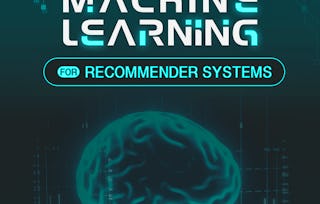This course, which is designed to serve as the first course in the Recommender Systems specialization, introduces the concept of recommender systems, reviews several examples in detail, and leads you through non-personalized recommendation using summary statistics and product associations, basic stereotype-based or demographic recommendations, and content-based filtering recommendations.

Introduction to Recommender Systems: Non-Personalized and Content-Based

Introduction to Recommender Systems: Non-Personalized and Content-Based
This course is part of Recommender Systems Specialization


Instructors: Joseph A Konstan
41,417 already enrolled
Included with
658 reviews
Skills you'll gain
Details to know

Add to your LinkedIn profile
12 assignments
See how employees at top companies are mastering in-demand skills

Build your subject-matter expertise
- Learn new concepts from industry experts
- Gain a foundational understanding of a subject or tool
- Develop job-relevant skills with hands-on projects
- Earn a shareable career certificate

There are 6 modules in this course
This brief module introduces the topic of recommender systems (including placing the technology in historical context) and provides an overview of the structure and coverage of the course and specialization.
What's included
2 videos1 reading
This module introduces recommender systems in more depth. It includes a detailed taxonomy of the types of recommender systems, and also includes tours of two systems heavily dependent on recommender technology: MovieLens and Amazon.com. There is an introductory assessment in the final lesson to ensure that you understand the core concepts behind recommendations before we start learning how to compute them.
What's included
9 videos2 readings2 assignments
In this module, you will learn several techniques for non- and lightly-personalized recommendations, including how to use meaningful summary statistics, how to compute product association recommendations, and how to explore using demographics as a means for light personalization. There is both an assignment (trying out these techniques in a spreadsheet) and a quiz to test your comprehension.
What's included
7 videos5 readings8 assignments1 programming assignment
The next topic in this course is content-based filtering, a technique for personalization based on building a profile of personal interests. Divided over two weeks, you will learn and practice the basic techniques for content-based filtering and then explore a variety of advanced interfaces and content-based computational techniques being used in recommender systems.
What's included
8 videos
The assessments for content-based filtering include an assignment where you compute three types of profile and prediction using a spreadsheet and a quiz on the topics covered. The assignment is in three parts -- a written assignment, a video intro, and a "quiz" where you provide answers from your work to be automatically graded.
What's included
2 videos3 readings2 assignments1 programming assignment
We close this course with a set of mathematical notation that will be helpful as we move forward into a wider range of recommender systems (in later courses in this specialization).
What's included
2 videos1 reading
Earn a career certificate
Add this credential to your LinkedIn profile, resume, or CV. Share it on social media and in your performance review.
Instructors


Offered by
Explore more from Machine Learning

28DIGITAL
 Status: Preview
Status: PreviewSungkyunkwan University
 Status: Free Trial
Status: Free TrialUniversity of Minnesota
 Status: Free Trial
Status: Free TrialUniversity of Minnesota
Why people choose Coursera for their career

Felipe M.

Jennifer J.

Larry W.

Chaitanya A.
Learner reviews
- 5 stars
60.39%
- 4 stars
29.13%
- 3 stars
6.37%
- 2 stars
2.12%
- 1 star
1.97%
Showing 3 of 658
Reviewed on Aug 15, 2019
The course was a good one with content that's understandable. I can't wait to proceed to the next one
Reviewed on Sep 18, 2016
it's a fantastic course that gives you a good idea of what the objectives of recommender systems are and some intuition on the way how it can be accomplished.
Reviewed on Dec 10, 2016
As a software engineer with computer science background I found that course enhancing my knowledge. I'm going to continue the specialization.

Open new doors with Coursera Plus
Unlimited access to 10,000+ world-class courses, hands-on projects, and job-ready certificate programs - all included in your subscription
Advance your career with an online degree
Earn a degree from world-class universities - 100% online
Join over 3,400 global companies that choose Coursera for Business
Upskill your employees to excel in the digital economy
Frequently asked questions
This specialization is a substantial extension and update of our original introductory course. It involves about 60% new and extended lectures and mostly new assignments and assessments. This course specifically has added material on stereotyped and demographic recommenders and on advanced techniques in content-based recommendation.
To access the course materials, assignments and to earn a Certificate, you will need to purchase the Certificate experience when you enroll in a course. You can try a Free Trial instead, or apply for Financial Aid. The course may offer 'Full Course, No Certificate' instead. This option lets you see all course materials, submit required assessments, and get a final grade. This also means that you will not be able to purchase a Certificate experience.
When you enroll in the course, you get access to all of the courses in the Specialization, and you earn a certificate when you complete the work. Your electronic Certificate will be added to your Accomplishments page - from there, you can print your Certificate or add it to your LinkedIn profile.
More questions
Financial aid available,

